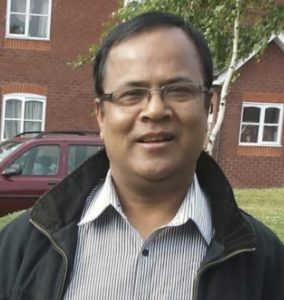Gagan Pradhan: The man who introduced coffee culture in Nepal

Graduated in Hospitality Management from William Blue Int’l Hotel Management School, Australia
Opened first outlet of Himalayan Java at Heritage Plaza, Kamaladi, in 1999
Husband of Nupur Pradhan
Father to Gaurav Pradhan and Nirosha Pradhan
 Until the late 90s, Nepal had no real coffee shops. Coffee meant instant coffee back then, and that too could only be found in a few hotels and restaurants.
I saw what coffee shops look like and how coffee tastes while I was in Australia for my studies. It was decided that I would return to Nepal after my studies, but I had no concrete plan regarding my career. I came to Nepal with a degree in hospitality management after five years, and started working for a prestigious hotel in Kathmandu. It was while working at this hotel that I realized that I was not meant to be a salaried worker. Even though I was being paid handsomely, I quit the hotel job within a week.
I wanted to start a business. For me, a business should be something innovative, or else you are doing the same as everyone else. Without a unique touch, a business can't make any difference in the market. So, I started visiting different places in Kathmandu, trying to figure out what I could do. It was a market research of sorts, where I asked a variety of questions to people from different walks of life. This is how I came up with the idea of starting a coffee shop. Many people were positive about having a coffee shop in the town and they promised to visit it if I opened one.
So, with a plan of starting a coffee shop, I went to the US and signed up for barista training. When I returned, I also brought along a coffee machine with me. It was the first coffee machine in Nepal.
With an investment of around Rs 1.3m, I opened the first Himalayan Java at Heritage Plaza, Kamaladi. I hired a few youths and trained them to prepare and serve coffee. I worked with them and did everything an employee has to do. I even dropped off my employees at their homes after work. We worked as a team. We discussed all work-related problems and sought their solutions.
In the early days, the setting and ambience of our shop used to confuse many of our clients. Since the setup was well furnished with couches, comfortable chairs and beautiful lighting, many people mistook Himalayan Java for a furniture store. Others thought we were running a computer-training center because of the word ‘Java’, a computer language. People didn’t know that java is a synonym for coffee.
Sustaining the business became a big issue for us because coffee had yet to seep into our culture. So, one day we decided to shift our establishment to Thamel, as the place saw heavy tourist footfall.
From then on we had a steady rise in the number of customers. It was mostly foreigners at first. Then came Nepalis who had lived overseas, who also brought their family and friends to our shop.
Though Himalayan Java was not doing a great business in its initial days, it never compromised on the quality of its products and service. It was not compulsory for our clients to order a drink. They could just visit us to spend their time inside.
All these things helped build our client numbers. It was them who did the marketing for us. Had I rushed things and followed a different path, I would not have contributed to establishing a coffee culture in Nepal. With time, we were able to expand our outlets. These days, coffee has become a part of life for many of us.
Coffee is a cash crop that is not easy to grow. Its production takes around seven years, so it is a long-term investment. And since the government does not offer any subsidies for coffee farming, Nepali farmers are not interested in coffee cultivation. This is despite the fact that Nepali coffee is one of the best in the world.
The annual consumption of coffee in Nepal is 10,000 metric tons. To fulfill this demand, Nepal imports coffee from India, Italy, Thailand, and Indonesia. If we were to improve Nepali production, this import could easily be ended and we could even export our coffee in the global market.
Himalayan Java started off as the first coffee shop in Nepal to specialize in handcrafted coffee and bakery and over the years, we have diversified from a small coffee shop to an international franchising Nepali coffee brand with 43 outlets around the world. In 2017, we started selling our franchise. Out of 43 outlets, my team currently owns 13.
I have always believed in maintaining a sustainable business ecosystem by supporting local farmers and Nepali products. Through continuous innovation in technology and process, we hope to become the most inspiring Nepali coffee establishment in the world. My goal is to take Nepali coffee and culture to the world.
To help the coffee culture flourish in Nepal, we not only serve coffee but also sell coffee machines and equipment, and offer essential barista training. I never see other coffee shops as my rivals. I happily invite them and share what I know about this industry, because I feel like a new coffee shop can help this culture grow.
About him
Dip Lama (Friend)
Until the late 90s, Nepal had no real coffee shops. Coffee meant instant coffee back then, and that too could only be found in a few hotels and restaurants.
I saw what coffee shops look like and how coffee tastes while I was in Australia for my studies. It was decided that I would return to Nepal after my studies, but I had no concrete plan regarding my career. I came to Nepal with a degree in hospitality management after five years, and started working for a prestigious hotel in Kathmandu. It was while working at this hotel that I realized that I was not meant to be a salaried worker. Even though I was being paid handsomely, I quit the hotel job within a week.
I wanted to start a business. For me, a business should be something innovative, or else you are doing the same as everyone else. Without a unique touch, a business can't make any difference in the market. So, I started visiting different places in Kathmandu, trying to figure out what I could do. It was a market research of sorts, where I asked a variety of questions to people from different walks of life. This is how I came up with the idea of starting a coffee shop. Many people were positive about having a coffee shop in the town and they promised to visit it if I opened one.
So, with a plan of starting a coffee shop, I went to the US and signed up for barista training. When I returned, I also brought along a coffee machine with me. It was the first coffee machine in Nepal.
With an investment of around Rs 1.3m, I opened the first Himalayan Java at Heritage Plaza, Kamaladi. I hired a few youths and trained them to prepare and serve coffee. I worked with them and did everything an employee has to do. I even dropped off my employees at their homes after work. We worked as a team. We discussed all work-related problems and sought their solutions.
In the early days, the setting and ambience of our shop used to confuse many of our clients. Since the setup was well furnished with couches, comfortable chairs and beautiful lighting, many people mistook Himalayan Java for a furniture store. Others thought we were running a computer-training center because of the word ‘Java’, a computer language. People didn’t know that java is a synonym for coffee.
Sustaining the business became a big issue for us because coffee had yet to seep into our culture. So, one day we decided to shift our establishment to Thamel, as the place saw heavy tourist footfall.
From then on we had a steady rise in the number of customers. It was mostly foreigners at first. Then came Nepalis who had lived overseas, who also brought their family and friends to our shop.
Though Himalayan Java was not doing a great business in its initial days, it never compromised on the quality of its products and service. It was not compulsory for our clients to order a drink. They could just visit us to spend their time inside.
All these things helped build our client numbers. It was them who did the marketing for us. Had I rushed things and followed a different path, I would not have contributed to establishing a coffee culture in Nepal. With time, we were able to expand our outlets. These days, coffee has become a part of life for many of us.
Coffee is a cash crop that is not easy to grow. Its production takes around seven years, so it is a long-term investment. And since the government does not offer any subsidies for coffee farming, Nepali farmers are not interested in coffee cultivation. This is despite the fact that Nepali coffee is one of the best in the world.
The annual consumption of coffee in Nepal is 10,000 metric tons. To fulfill this demand, Nepal imports coffee from India, Italy, Thailand, and Indonesia. If we were to improve Nepali production, this import could easily be ended and we could even export our coffee in the global market.
Himalayan Java started off as the first coffee shop in Nepal to specialize in handcrafted coffee and bakery and over the years, we have diversified from a small coffee shop to an international franchising Nepali coffee brand with 43 outlets around the world. In 2017, we started selling our franchise. Out of 43 outlets, my team currently owns 13.
I have always believed in maintaining a sustainable business ecosystem by supporting local farmers and Nepali products. Through continuous innovation in technology and process, we hope to become the most inspiring Nepali coffee establishment in the world. My goal is to take Nepali coffee and culture to the world.
To help the coffee culture flourish in Nepal, we not only serve coffee but also sell coffee machines and equipment, and offer essential barista training. I never see other coffee shops as my rivals. I happily invite them and share what I know about this industry, because I feel like a new coffee shop can help this culture grow.
About him
Dip Lama (Friend)
 It is difficult to critically describe one of my very good friends as I have not found any flaws in him—neither as a professional person, nor as a friend. If he wanted to be an ordinary businessperson, there were many easy ways for him, but he wanted to establish a culture in this country. And what a job he has done!
Dr Niraj Lal Baidya (Friend)
It is difficult to critically describe one of my very good friends as I have not found any flaws in him—neither as a professional person, nor as a friend. If he wanted to be an ordinary businessperson, there were many easy ways for him, but he wanted to establish a culture in this country. And what a job he has done!
Dr Niraj Lal Baidya (Friend)
 Gagan has been my neighbor for around six years. We became very good friends from the day we met. Besides being a confident, intelligent, and careful decision-maker in his business, he is also a kind-hearted human being. He cares for his staff and has built a strong team, which I think is the secret to his success.
Prakash Lal Malla (Uncle)
Gagan has been my neighbor for around six years. We became very good friends from the day we met. Besides being a confident, intelligent, and careful decision-maker in his business, he is also a kind-hearted human being. He cares for his staff and has built a strong team, which I think is the secret to his success.
Prakash Lal Malla (Uncle)
 He is a hard-working and ambitious person. These traits have helped him become a successful businessman. I have seen success get to many people’s heads, not Gagan. He has always been a down-to-earth person. He spends plenty of time with his family and friends, guiding them when they are in need. Besides being a family man, he is also a good role model and a mentor.
He is a hard-working and ambitious person. These traits have helped him become a successful businessman. I have seen success get to many people’s heads, not Gagan. He has always been a down-to-earth person. He spends plenty of time with his family and friends, guiding them when they are in need. Besides being a family man, he is also a good role model and a mentor.
related news
Harry Bhandari: An inspiring tale of Nepali immigrant in the US
Sept. 14, 2023, 4:06 p.m.
Baburam Bhattarai: An analysis on Nepal’s underdevelopment
Sept. 4, 2023, 9:36 a.m.
Shyam Goenka: Institutionalizing free press and democracy
Aug. 29, 2023, 7:42 p.m.
Sunil Babu Pant: A guardian of LGBTIQA+ community
March 11, 2023, 10:01 p.m.
Usha Nepal: An inspiration to every working woman
Feb. 25, 2023, 9:42 p.m.
Anupama Khunjeli: A trailblazer banker
Feb. 19, 2023, 12:54 a.m.
Capt Siddartha Jang Gurung: Aviation rescue specialist
Feb. 12, 2023, 1:26 a.m.
Bhuwan Chand: Born to perform
Feb. 4, 2023, 6:36 p.m.










Comments